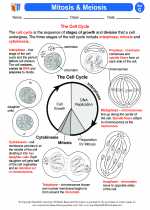Cell Reproduction -> epithelial tissue
What is Epithelial Tissue?
Epithelial tissue is one of the four primary types of tissue in the human body. It covers the body's surface, lines internal organs, and forms glands. This tissue is composed of tightly packed cells arranged in continuous sheets.
Types of Epithelial Tissue
There are several types of epithelial tissue, including:
- Squamous epithelium: These cells are flat and thin, forming the lining of the blood vessels, alveoli of the lungs, and parts of the kidney.
- Cuboidal epithelium: These cells are cube-shaped and are found in the kidney tubules and various glands.
- Columnar epithelium: These cells are tall and rectangular, lining the digestive tract and parts of the respiratory system.
- Transitional epithelium: These cells can change shape, found in the urinary bladder.
Functions of Epithelial Tissue
Epithelial tissue serves several important functions, including:
- Protection: It acts as a barrier to protect underlying tissues from physical and chemical injury.
- Absorption: Some epithelial cells are specialized for absorbing nutrients and other substances.
- Secretion: Glandular epithelial cells secrete substances such as hormones, enzymes, and sweat.
- Sensation: Certain epithelial cells have sensory functions, such as taste buds and olfactory receptors.
Study Guide for Epithelial Tissue
When studying epithelial tissue, it's important to focus on the following key points:
- Understand the basic structure of epithelial tissue and how it differs from other types of tissue.
- Memorize the different types of epithelial cells and where they are found in the body.
- Learn about the specialized functions of epithelial tissue, such as protection, absorption, secretion, and sensation.
- Study examples of epithelial tissue in different organs and their specific functions.
By mastering these concepts, you will have a solid understanding of epithelial tissue and its significance in the human body.
.◂Science Worksheets and Study Guides Seventh Grade. Cell Reproduction
Study Guide Cell Reproduction
Cell Reproduction  Activity Lesson
Activity Lesson Mitosis & Meiosis
Mitosis & Meiosis  Worksheet/Answer key
Worksheet/Answer key Cell Reproduction
Cell Reproduction  Worksheet/Answer key
Worksheet/Answer key Cell Reproduction
Cell Reproduction  Worksheet/Answer key
Worksheet/Answer key Cell Reproduction
Cell Reproduction  Vocabulary/Answer key
Vocabulary/Answer key Cell Reproduction
Cell Reproduction  Vocabulary/Answer key
Vocabulary/Answer key Cell Reproduction
Cell Reproduction  Vocabulary/Answer key
Vocabulary/Answer key Cell Reproduction
Cell Reproduction  Vocabulary/Answer key
Vocabulary/Answer key Cell Reproduction
Cell Reproduction  Vocabulary/Answer key
Vocabulary/Answer key Cell Reproduction
Cell Reproduction  Vocabulary/Answer key
Vocabulary/Answer key Cell Reproduction
Cell Reproduction  Vocabulary/Answer key
Vocabulary/Answer key Cell Reproduction
Cell Reproduction  Vocabulary/Answer key
Vocabulary/Answer key Cell Reproduction
Cell Reproduction 

 Activity Lesson
Activity Lesson
 Worksheet/Answer key
Worksheet/Answer key
 Worksheet/Answer key
Worksheet/Answer key
 Worksheet/Answer key
Worksheet/Answer key
 Vocabulary/Answer key
Vocabulary/Answer key
 Vocabulary/Answer key
Vocabulary/Answer key
 Vocabulary/Answer key
Vocabulary/Answer key
 Vocabulary/Answer key
Vocabulary/Answer key
 Vocabulary/Answer key
Vocabulary/Answer key
 Vocabulary/Answer key
Vocabulary/Answer key
 Vocabulary/Answer key
Vocabulary/Answer key
 Vocabulary/Answer key
Vocabulary/Answer key

The resources above cover the following skills:
LIFE SCIENCE
From Molecules to Organisms: Structures and Processes
Gather and synthesize information to explain how prokaryotic and eukaryotic cells differ in structure and function, including the methods of asexual and sexual reproduction.